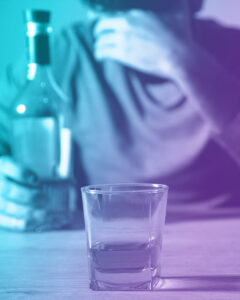Alcoholism And Panic Attacks
It’s the fourth time it has happened this year: a normal night out turns into a nightmare of epic proportions.
You are at the bar, drinking with your friends and having a good time. Then, out of nowhere, you feel like someone is watching you. Their eyes seem to follow your every move as you try to maneuver around. Your chest is tight, your heart racing, sweat beading on your forehead as you try to find a way out. But there are too many people around, and the walls feel like they are closing in. You see one of your friends and beg him to get you out. Once outside, your head clears, your breathing begins to slow down, and you feel the cool night air on your face. Why does this keep happening? Are you going crazy?

In Manatee County, 954 per 100,000 residents were hospitalized for a mental health condition in 2021. Clean Recovery Centers understands the role that alcohol use can play in mental health, and offers a treatment path that addresses both conditions. Each facility is equipped with a certified rapid-resolution therapist onsite to address past traumas and delve into the root causes of addiction. Today, we are discussing how alcoholism and panic attacks can create a negative cause-and-effect pattern.
The Relationship Between Alcohol and Panic Attacks
Alcohol is a depressant, meaning it slows the central nervous system. It enters the bloodstream through the stomach lining, and then is transported to the brain. In the brain, alcohol affects different regions, such as the hippocampus. This area controls memory creation and storage of old memory. Alcohol can make it difficult to recall previous memories or transition new memories to storage. This can lead to a rise in anxiety, which can set off a panic attack.
Panic attacks occur without warning and when there is no apparent danger nearby. They are not necessarily linked to anxiety disorders, but people diagnosed with anxiety or panic disorder are more likely to experience them. But, can drinking alcohol set off a panic attack? The area of the brain responsible for aggression, fear, and defensive behavior is the amygdala. It also is responsible for storing fear-related memories, which can trigger panic attacks. Alcohol also affects the amygdala by reducing or exacerbating the brain’s response to threats. This means that some see no danger in fearful situations. In others, fear is driven higher even when no threat is present. When managing an anxiety disorder on top of that, a panic attack can be triggered.
What to Do When You’re Having a Panic Attack
Panic attacks come on suddenly and do not typically last long. There may have been a stressor triggered or a situation or a person that triggered a fear-related memory. When experiencing a panic attack, remove yourself to a quiet and safe space. This could be a vehicle, a secluded area outside, or a private room. Take slow, deep breaths and focus your thoughts on something calming, such as a happy memory or a peaceful beach. The attack should pass in about 20 minutes.
Symptoms of Panic Attacks
Symptoms of panic attacks include:
- Increased heart rate
- Sweating
- Trembling
- Nausea
- Tightness in the chest
- Chills
- Headaches
- Dizziness
- Feelings of disconnect from reality (derealization/depersonalization)
- Fears of possibly dying or having a heart attack
Does Anxiety Cause Panic Attacks?
 Anxiety is classified as a feeling of fear or dread, and it can last for weeks at a time. Common types of anxiety include:
Anxiety is classified as a feeling of fear or dread, and it can last for weeks at a time. Common types of anxiety include:
Generalized anxiety disorder – while anxiety is natural, those with generalized anxiety disorder experience excessive worry or fear for longer than 6 months.
Panic disorder – those with panic disorder are prone to panic attacks. While some people experience panic attacks once or twice in their lifetime, people with panic disorder will experience them regularly.
Phobias – phobias are intense fears of a specific thing or situation that poses little to no threat. Some common phobias are spiders/insects, crowded places, and heights.
Having anxiety does not guarantee a panic attack will happen, nor does having a panic attack mean there is an anxiety disorder present. However, feeling increased anxiety can trigger a panic attack.
What Does Alcohol-Induced Panic Attack Feel Like?
Drinking alcohol reduces inhibitions, meaning rational thinking is affected. Many of us picture those videos of intoxicated men riding lawn mowers across a frozen pond in just shorts. But reduced inhibitions also means letting down your guard. If you have past trauma or an anxiety disorder and drink alcohol, increased feelings of panic can result. Alcohol-induced panic attacks feel similar to regular panic attacks, but paired with lower inhibitions, the attack can feel more severe. It will be harder to form rational thoughts, which will also increase how long the panic attack lasts. If ever thoughts of self-harm or suicide occur during an alcohol-induced panic attack, seek medical attention immediately.
Risk Factors for Alcoholism and Panic Attacks
Risk factors for alcoholism and panic attacks share some overlap. These include:
- Having a family member with substance use disorder or panic disorder
- Having a mental health condition
- Drinking at an early age
- History of trauma
- Early social exposure to alcohol or anxiety
What is Hangxiety?
Have you ever felt guilty after drinking? Or nervous like something you did the previous night was embarrassing? This is where hangxiety comes in. While not a medical term, hangxiety describes the feelings of anxiousness after a session of drinking. It is common in those who participated in binge drinking and experienced a blackout as memories are hazy or nonexistent. Hangxiety typically is accompanied by other hangover symptoms such as headaches, nausea, and fatigue. Feelings of anxiety typically subside with proper hydration and rest, as well as talking with a friend to help with memory. But in some cases, hangxiety can lead to panic attacks and thoughts of suicide. Medical intervention should be sought if this occurs.
How to Stop a Panic Attack When You’re Hungover
Dehydration from alcohol is one of the biggest contributors to a hangover. While there is no way to stop a panic attack while happening, proper hydration and a nutritious meal can help reduce anxiety while hungover. Getting plenty of rest can also help prevent a panic attack from beginning.
Panic attacks can occur while hungover from alcohol withdrawal. The longer a person drinks, the brain becomes accustomed to having alcohol in the system. When alcohol is not present, the brain attempts to regain balance. This sends the body into withdrawal, and symptoms can set off increased anxiety. Coupled with nausea, headaches, and cravings, anxiety can lead to panic and eventually a panic attack.
How to Calm My Anxiety After Drinking
The best way to calm anxiety after drinking is to rest. Alcohol may seem to make it easier to fall asleep, but it disrupts sleeping patterns. This makes sleep not restful or rejuvenating. Proper rest ensures the brain is restored and able to function to the best of its ability. Talking with family or friends, exercise, and simple activities like reading a book can also help calm feelings of anxiety.
Getting Treatment for Panic Attacks and Alcohol Use Disorder in Manatee County, FL
Experiencing panic attacks while drinking or after is not a comfortable way to live. Finding an alcohol detox and rehab can address both alcohol use disorder and mental health treatment. Side effects of both conditions can feel overwhelming, but taking the first courageous step into treatment will be the greatest decision of your life. Letting go of fear will be a fresh breath of air, and the weight lifting off of your shoulders is far more rewarding than alcohol ever was.
If you or someone you love is managing panic attacks and an alcohol use disorder, help is not far away. Clean Recovery Centers has locations across the Suncoast, with a dedicated staff and housing at each location. Our unique, three-phase approach to addiction treatment can be modified for mental health, and we can treat a mental health condition as a primary diagnosis. The alcohol detox program is monitored 24/7 to ensure safety and mental well-being. Call us today at (888) 330-2532 to learn more about our facility and program.
FAQs
Does alcohol use disorder cause anxiety?
Alcohol use disorder does not cause anxiety; however, it can cause symptoms of anxiety to appear or worsen.
Is anxiety considered a side effect of alcoholism?
Anxiety can be a symptom of alcohol withdrawal, which is caused by alcoholism.
Sources:
- https://www.flhealthcharts.gov/ChartsDashboards/rdPage.aspx?rdReport=NonVitalInd.Dataviewer&cid=9877


